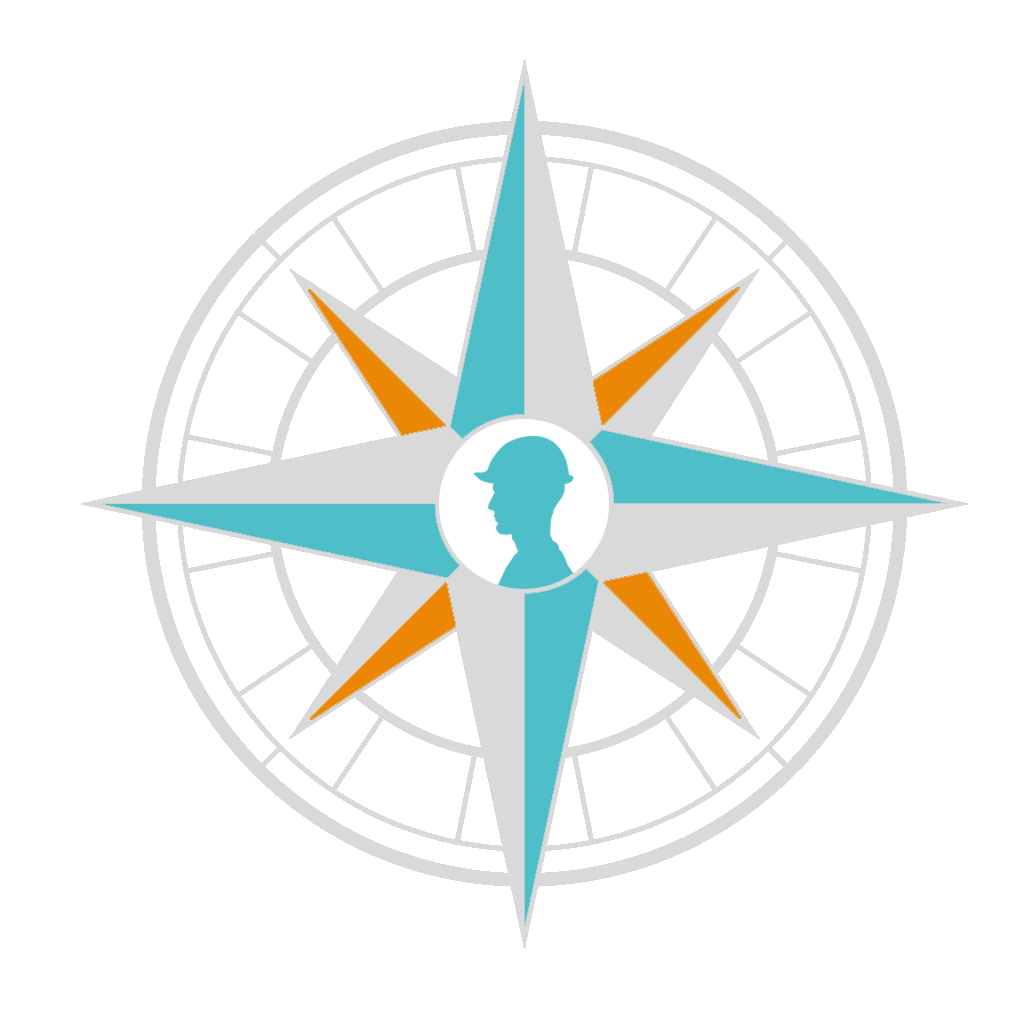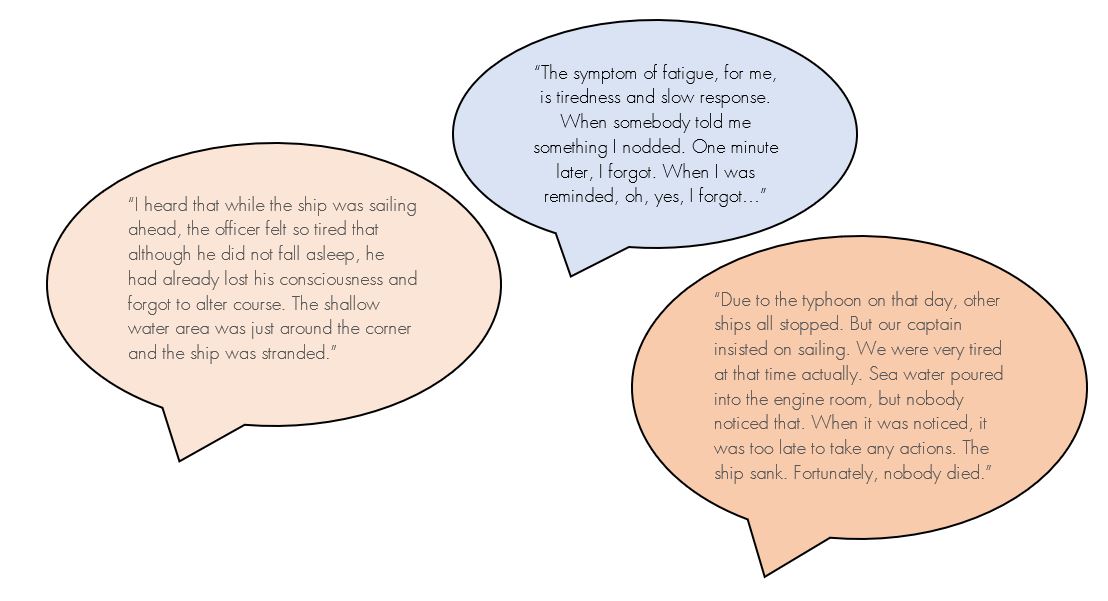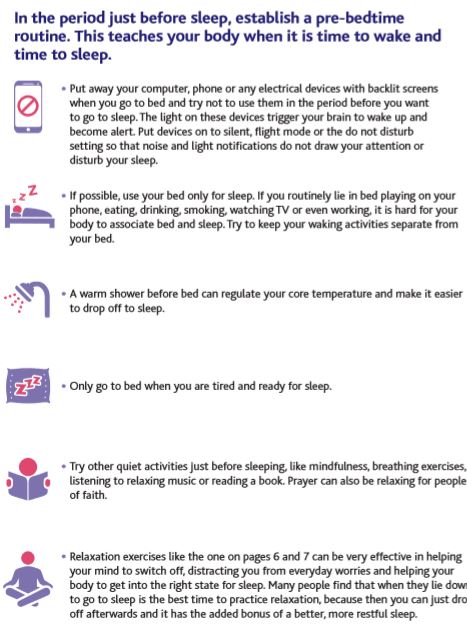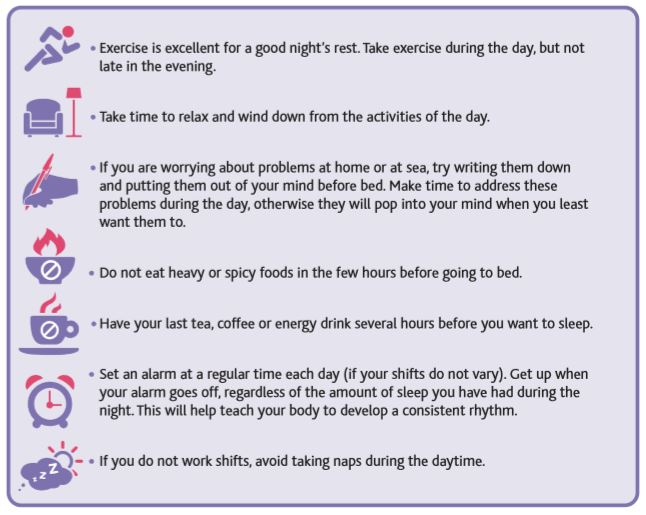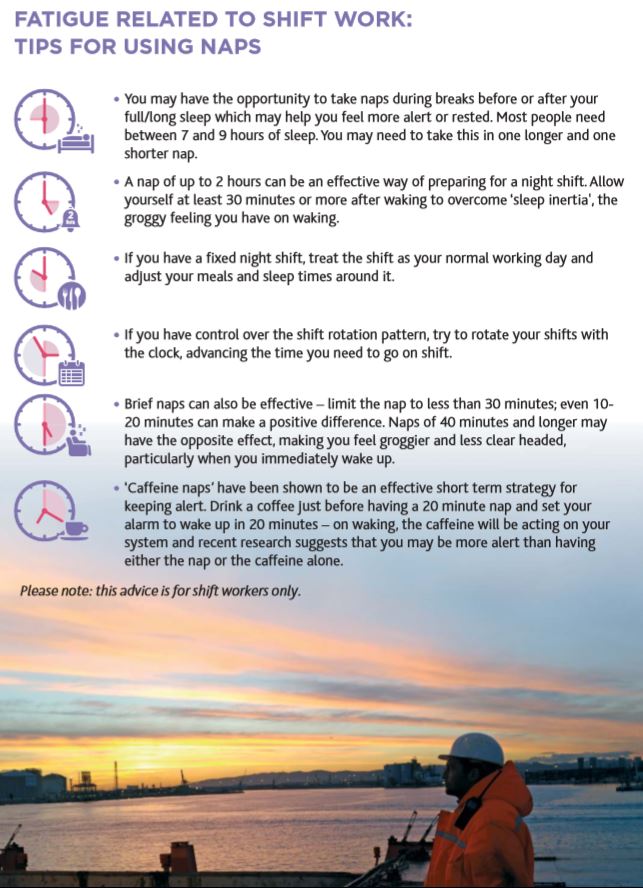
Did you know that lack of sleep is a big cause of workplace incidents and accidents?
Research shows that if you have been awake for 17 hours or more, your performance is as if you had a Blood Alcohol Concentration (BAC) of 0.05%! It matters how long you have been asleep and it matters how long you have been awake - you can’t turn up on duty with a BAC of 0.05%, so why work fatigued?
Sleep is as important as food and water, so it’s essential we get enough of it for peak health and performance.
Good sleep can improve your mood, how well you can cope with life and how well your immune system functions. It also helps keep blood sugar and weight steady and even reduces your risk of cancer.
Not enough sleep can lead to fatigue. Fatigue is dangerous because you may not even recognise just how fatigued you are and it may put you and your colleagues at risk. Fatigue affects anyone, regardless of skill, knowledge, experience or training.
There are many reasons you may be fatigued. These can include being awake when your body wants you to sleep, such as working at night, how long you have been awake, and/or the amount and quality of sleep you have had.
Fatigue symptoms
What does fatigue look like?
Fatigue is defined by the Association of Oil and Gas Producers (IOGP) as ‘’a lack of mental alertness, or drowsiness, arising from lack of sleep. It does not include effects of physical effort, exposure to heat, or stress, etc.”
Some of the warning signs of fatigue are:
- Not being able to stay awake (e.g. eyes not fully opened, red eyes, frequent eye blinks)
- Moodiness
- Poor decision making (e.g. judging risk, speed, distance and time)
- Slow responses
- Finding it hard to concentrate, taking more risks
- Clumsiness, reduced situational awareness, poor coordination
- Headaches and dizziness
- Loss of appetite or overeating
Fatigue can affect all parts of our lives, from mood, work, relationships, health and more. To understand how risky fatigue can be, you can read some real-life examples from seafarers across the world.
Taken from Barnett et al., (2017). Project MARTHA: The Final Report. 10.13140/RG.2.2.30339.30249
Managing fatigue
Here are some tips on how to look after yourself so you can improve your sleep and reduce fatigue:
Do’s for seafarers
- Keep good sleeping habits/routine aka proper ‘sleep hygiene’
- Eat healthy meals regularly
- Take well-timed naps, a nap of 20mins or so can be beneficial but be aware of sleep inertia and give yourself time to wake properly before doing anything, at least 10-15mins.
- Exercise regularly
- Drink enough water, stay hydrated
- Use relaxation techniques (i.e. meditation, yoga, listen to music, read a book you have already read, write in your journal etc.)
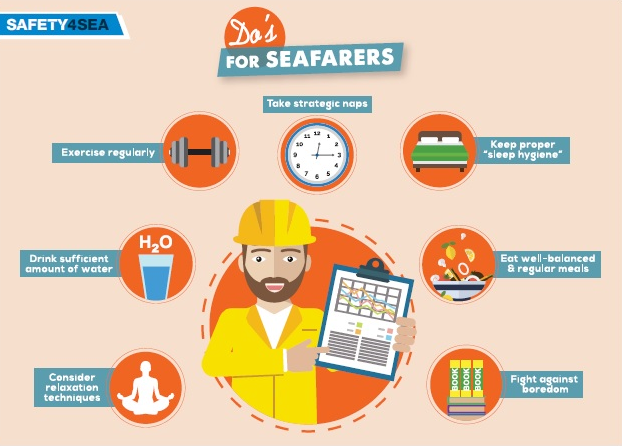
Do’s for ship management team
- Include any lessons learned relating to fatigue in safety meetings.
- Provide fatigue and sleep information to crews, provide formal fatigue training.
- Increase crew understanding of the long-term consequences of fatigue.
- Encourage self-reporting of fatigue.
- Actively manage fatigue risk; track and monitor control measures for effectiveness.
- Ensure shipboard living conditions (e.g. living space, accommodation temperature, mattresses and pillows, black out curtains) are well maintained.
- Rotate jobs to break up monotony and keep crew engaged.
- Schedule drills in a proper manner to minimise the disturbance of rest/sleep periods.
- Schedule watch-keeping practices and duties so that seafarers are able to adequately rest/sleep.
- Give crew sufficient time to recover from fatigue, e.g. don’t plan extra crew activities unless required for statutory reasons or reduce short term overtime requirements.
- Allow crew members ‘the authority to stop’ when fatigued and to report to their lead.
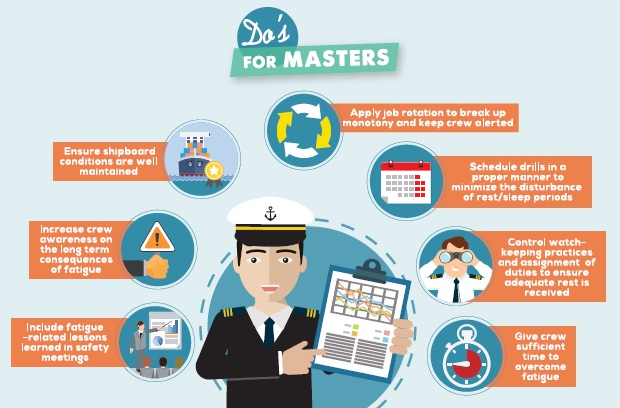
Work and rest regulations:
It is helpful to know the hours of work and rest regulations, including maximum hours of work and minimum hours of rest in the Maritime Labour Convention (MLC 2006), since these requirements are designed to protect against prolonged working hours and hence a way of managing wake and sleep behaviour.
If your work schedule means you are often unable to get the rest/sleep you need, tell your supervising officer. If you feel unable to discuss this onboard, use the process your company has in place for escalating concerns to your superintendent, crewing officer or the Designated Person Ashore (DPA). If you do not feel you are able to talk about this with someone within your company, SeafarerHelp (ISWAN’s helpline for seafarers) can help explain your options. They can be contacted through their website: www.seafarerhelp.org
There are simple things you can do to help maximise your sleep while off duty. Take the available opportunities within your schedule to sleep. Keeping to the same sleeping and waking hours based on your schedule (have a routine for nights, have a routine for days, for afternoons etc.), as much as possible, is an excellent way of getting sleep. Your body likes a sleep routine (set wake and sleep times) and such a routine is likely to help you to wind down, prepare for and initiate sleep.
To get to sleep and feel well-rested:
Taken from ISWAN “Managing Stress and Sleeping Well at Sea”
Tips for preparing your cabin:
When you want to be awake and alert use bright lighting – either daylight bulbs (if they are available) or open the curtains and let the sunlight in during hours of daylight. Get outside into the day light if that is possible and safe to do.
When you want to rest or sleep, if available, use blackout blinds or curtains and dim or turn off any lighting in your cabin. If your cabin still isn’t dark enough, bring an eye mask with you to use on your voyages. If noise is a problem, you can try using ear plugs or putting on soothing music (e.g. sounds of nature or music you know helps you sleep), white noise (such as the noise generated by a fan or air-conditioner).
Other tips for getting a good night's sleep:
Taken from ISWAN “Managing Stress and Sleeping Well at Sea”
Taken from ISWAN “Managing Stress and Sleeping Well at Sea”
Jet lag
What is jet lag?
Jet lag can happen when you move across time zones (when sailing or flying) and is caused by the disconnect between your body clock and the time around you. For example, when you travel across time zones to join your ship there is likely to be a shift in the day/night cycle and that may cause sleep problems and hence fatigue.
Remember how tired and sleepy you and the other new joiners felt the first day onboard? This happens because your body is still used to the time zone back home and it needs to adjust to your current location and time.
Scientists say that jet lag can last several days, and to fully recover you need about one day for each time zone crossed (so if you travel across 3 time zones you would need about 3 days to recover). Every person reacts differently, so it is important to look after yourself and take it easy until you have fully adjusted to your current time zone(s).
Jet lag problems can be overcome faster through paying attention to the timing of light exposure and main meals. It is also easier to adjust when crossing from east to west than from west to east.
Signs of jet lag:
- You may be wide awake when the time of day suggests you should ideally be asleep.
- You are tired when you should be more alert.
- Wanting to eat and sleep at unusual times.
- Digestion can be disrupted resulting in constipation and or diarrhea.
- Lower performance on mental and/or physical tasks.
- Mood change.
Top tips for managing jet lag
Before you leave:
- When joining a vessel, you can start preparing for the new time zone when you are still at home.
- If you are traveling westward, then shift sleeping time later 1-2 hours for a few days before your trip.
- If you are traveling eastward, then shift sleeping time earlier 1-2 hours a few days before your trip.
- For every 15 degrees of longitude (west/east) of travel you will have to delay or advance your sleep by an hour. For example, if you travel 15 degrees west you will need to go to bed one hour later.
During the flight:
- Before getting on the plane set your watch to the local time.
- Drink plenty of water.
- Try to sleep and eat your meals according to your destination time zone.
After arrival:
- General: Try to get used to the local time zone as soon as possible. For example, if you arrive at 6 p.m. local time (but noon at home), eat dinner, not lunch. If your normal bedtime at home is 11 p.m., go to bed at 11 p.m. local time (even if it's only 5 p.m. at home). If you’re exhausted and need to sleep during the day, then limit your nap to 30 minutes.
- For westward travel: Get plenty of sunlight whenever you can. Late afternoon/early evening exercise is better.
- For eastward travel: Avoid morning/lunchtime sunlight (wear sunglasses when outdoors), late afternoon/early evening sunlight is best. Morning/lunchtime exercise is better.
Onboard:
- It is important that you understand jet lag can impact when you may experience fatigue.
- Do not push yourself if you are feeling unwell.
- Drink plenty of water and eat healthy meals.
- Try and get as much sunlight/artificial light at times you need to be awake and keep it as dark as possible when you want to sleep.
- If you are jet lagged and or experiencing fatigue, pair up with a colleague when performing difficult and/or high-risk duties, so that you can double check the procedures and call out aloud the steps you are taking to complete your tasks.
- Make yourself aware of when your vessel adjusts the clocks forward / back and adjust your sleep pattern accordingly.
- Understand how your Senior Management Team manage watchkeeping, as it may be done differently, e.g. using one watchkeeper for the extended period or splitting the hour into 20 minutes over the watches.
Remember that your body will adjust eventually to your current time zone
Now try the practical exercises you can download below
Information in this guide is taken from information contained in references below
